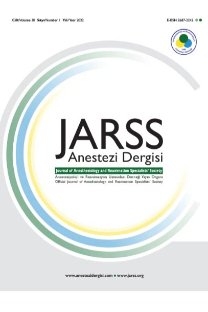Spinal anestezi sonrası nadir görülen bir komplikasyon; spinal epidural abse
A rare complıcatıon after spınal anasthesıa; spınal epıdural abscess
___
- 1.Köksal V, Güçer H. Sa¤lkl Bir nsanda Progresif Paraparezi ile Ortaya Çıkan Torakal Spinal Epidural Ampiyem ve Cerrahi Tedavisi: Olgu Sunumu. Türk Nöroflirürji Dergisi 2011; 21: 60-63.
- 2.Curry WT Jr, Hoh BL, Amin-Hanjani S, Eskandar EN. Spinal epidural abscess: clinical presentation, management, and outcome. Surg Neurol 2005; 63: 364-371.
- 3.Hernandez JM, Coyle FP, Wright CD, Ballantyne JC. Epidural abscess after epidural anesthesia and continous epidural analgesia in a patient with gastric lymphoma. J Clin Anesth 2003; 15: 48-51.
- 4.Horlocker TT, Wedel DJ. Infectious complications of regional anesthesia. Best Pract Res Clin Anaesthesiol 2008; 22: 451-475.
- 5.Grabysa R, Moczulska B. Spinal epidural abscess penetrating into retroperitoneal space in patient with diabetes mellitus type 2: early diagnosis and treatment requirement. Pol Arch Med Wewn 2008; 118: 68-72.
- 6.Lu CH, Chang WN, Lui CC, Lee PY, Chang HW. Adult spinal epidural abscess: clinical features and prognostic factors. Clin Neurol Neurosurg 2002; 104: 306-310.
- 7.Choma T, Burke M, Kim C, Kakarlapudi R. Epidural abscess as a delayed complication of spinal instrumentation in scoliosis surgery: a case of progressive neurologic dysfunction with complete recovery. Spine 2008; 33: 76-80.
- 8.Darouiche RO. Spinal epidural abscess. N Engl J Med. 2006; 355; 2012-2020.
- 9.Löhr M, Reithmeier T, Ernestus RI, Ebel H, Klug N. Spinal epi- dural abscess: prognostic factors and comparison of different sur- gical treatment strategies. Acta Neurochir 2005; 147: 159-166.
- 10.Tang HJ, Lin HJ, Liu YC, Li CM: Spinal epidural abscess -- experience with 46 patients and evaluation of prognostic factors. J Infect 2002; 45: 76-81.
- ISSN: 1300-0578
- Yayın Aralığı: 4
- Başlangıç: 1993
- Yayıncı: Betül Kartal
Spinal anestezi sonrası nadir görülen bir komplikasyon; spinal epidural abse
Serdar KOKULU, Hacer TEMİZ CINGIL, Elif BAKI DOĞAN, Yüksel ELA, Ergün KARAVELİOĞLU, Adem ASLAN
Mehtap HONCA, B. Berna KÜLAH, E.Arzu KÖSE, Türker TÜRKER, Eyüp HORASANLI
Hüseyin C. TURGUT, İ. Aydın ERDEN, Seda B. AKINCI, Fatma SARICAOĞLU, Sevgen ÖNDER, Kamer KILINÇ, Hüsnü Can BAŞER, Ülkü AYPAR
Fulya DURAN YILMAZ, Murat Yaşar ÖZKALKANLI, Fevzi CENGİZ
İntravenöz rejyonal anestezide prilokaine magnezyum eklenmesinin etkileri
Ebubekir SALDUŞ, Selmin ÖKESLİ, ALPER KILIÇASLAN, Barış ÇANKAYA, Yasin TİRE
Fatma AKELMA KAVAK, Jülide ERGİL, Derya ÖZKAN, MELİH AKINCI, Mustafa ÖZMEN, Haluk GÜMÜŞ
KEMAL TOLGA SARAÇOĞLU, Zeynep ETİ, MUSTAFA ÜMİT UĞURLU, Meliha ORHON, Fevzi Yılmaz GÖĞÜŞ
Bardet-biedl sendromlu olguda anestezi ve postoperatif hemşire kontrollü analjezi uygulaması
AYÇA TAŞ TUNA, İRFAN GÜNGÖR, Hasan Ali KİRAZ, Hülya ÇELEBİ, Zafer TÜRKYILMAZ
